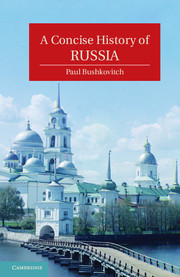Book contents
- Frontmatter
- Contents
- List of Figures
- Abbreviations
- Acknowledgments
- Prologue
- 1 Russia before Russia
- 2 Moscow, Novgorod, Lithuania, and the Mongols
- 3 The Emergence of Russia
- 4 Consolidation and Revolt
- 5 Peter the Great
- 6 Two Empresses
- 7 Catherine the Great
- 8 Russia in the Age of Revolution
- 9 The Pinnacle of Autocracy
- 10 Culture and Autocracy
- 11 The Era of the Great Reforms
- 12 From Serfdom to Nascent Capitalism
- 13 The Golden Age of Russian Culture
- 14 Russia as an Empire
- 15 Autocracy in Decline
- 16 War and Revolution
- 17 Compromise and Preparation
- 18 Revolutions in Russian Culture
- 19 Building Utopia
- 20 War
- 21 Growth, Consolidation, and Stagnation
- 22 Soviet Culture
- 23 The Cold War
- Epilogue
- Further Reading
- Index
Prologue
Published online by Cambridge University Press: 05 June 2012
- Frontmatter
- Contents
- List of Figures
- Abbreviations
- Acknowledgments
- Prologue
- 1 Russia before Russia
- 2 Moscow, Novgorod, Lithuania, and the Mongols
- 3 The Emergence of Russia
- 4 Consolidation and Revolt
- 5 Peter the Great
- 6 Two Empresses
- 7 Catherine the Great
- 8 Russia in the Age of Revolution
- 9 The Pinnacle of Autocracy
- 10 Culture and Autocracy
- 11 The Era of the Great Reforms
- 12 From Serfdom to Nascent Capitalism
- 13 The Golden Age of Russian Culture
- 14 Russia as an Empire
- 15 Autocracy in Decline
- 16 War and Revolution
- 17 Compromise and Preparation
- 18 Revolutions in Russian Culture
- 19 Building Utopia
- 20 War
- 21 Growth, Consolidation, and Stagnation
- 22 Soviet Culture
- 23 The Cold War
- Epilogue
- Further Reading
- Index
Summary
Russia is not an idea. It is a specific country, with a particular place on the globe, a majority language and culture, and a very concrete history. Yet for most of the twentieth century, outside of its boundaries, it has been an idea, not a place – an idea about socialism. Tremendous debates have raged over its politics, economics, and culture, most of them conducted by and for people who did not know the language, never went there, and knew very little about the country and its history. Even the better informed wrote and spoke starting from presuppositions about the desirability or undesirability of a socialist order. Some were crude propagandists, but even the more conscientious, those who learned the language and tried to understand the country, began by posing questions that came from their assumptions about socialism. The result was a narrow agenda of debate: was a planned economy effective or not? How many political prisoners were there? How could the Soviets put a man in space? Should the system be called socialism, communism, or totalitarianism? Was “communism” a result of Russian history? Did the Russian intelligentsia prepare the way for communism, unintentionally or not? Did the gradual modernization of Russia make 1917 inevitable? In all these debates the history of Russia up to the moment of the revolution was just a preface.
In Russia the collapse of the Soviet Union brought to light a flood of historical publications. These publications include numerous monographs on a great variety of topics, many biographies, and a massive quantity of publications of the various records of the Soviet regime, including the deliberations of its leaders. The aim of these publications was to illuminate the areas previously closed to investigation, and naturally the first post-Soviet writings were devoted to the most controversial or mysterious issues. Books on the Ribbentrop-Molotov pact of 1939, collectivization, and famine; publications of Stalin’s private correspondence; and other issues were first on the agenda. Western historians participated in these publications, which gave a whole new understanding of the contentious issues of Soviet history. Yet the result is far from perfect. As the document publications and monographs continue to pour out in Russia and abroad, they pose more and more questions that historians used to the politicized debates of the Cold War era never thought about. Paradoxically, it seems harder rather than easier to understand the story of the Soviet era of Russian history. The present work reflects this difficulty, and the reader will find many questions left unresolved.
- Type
- Chapter
- Information
- A Concise History of Russia , pp. xv - xxivPublisher: Cambridge University PressPrint publication year: 2011

